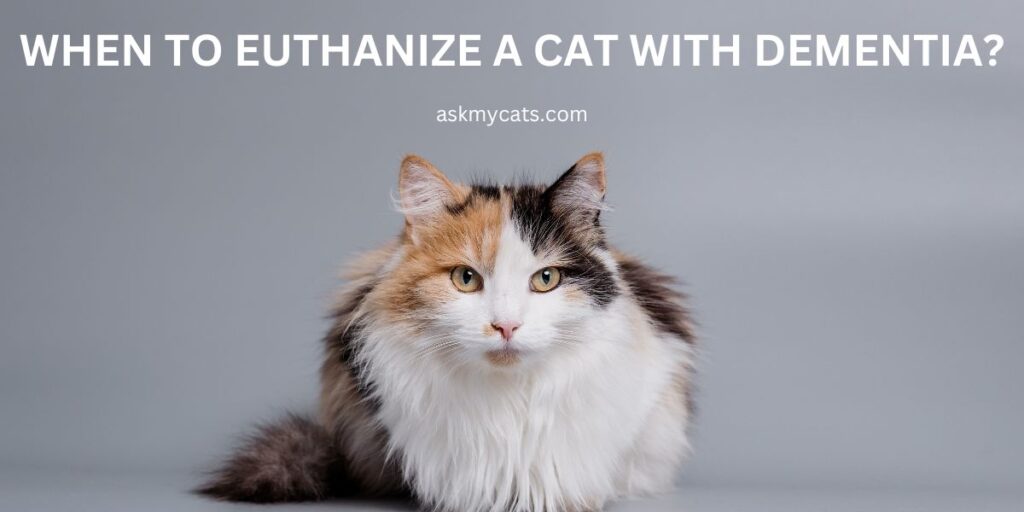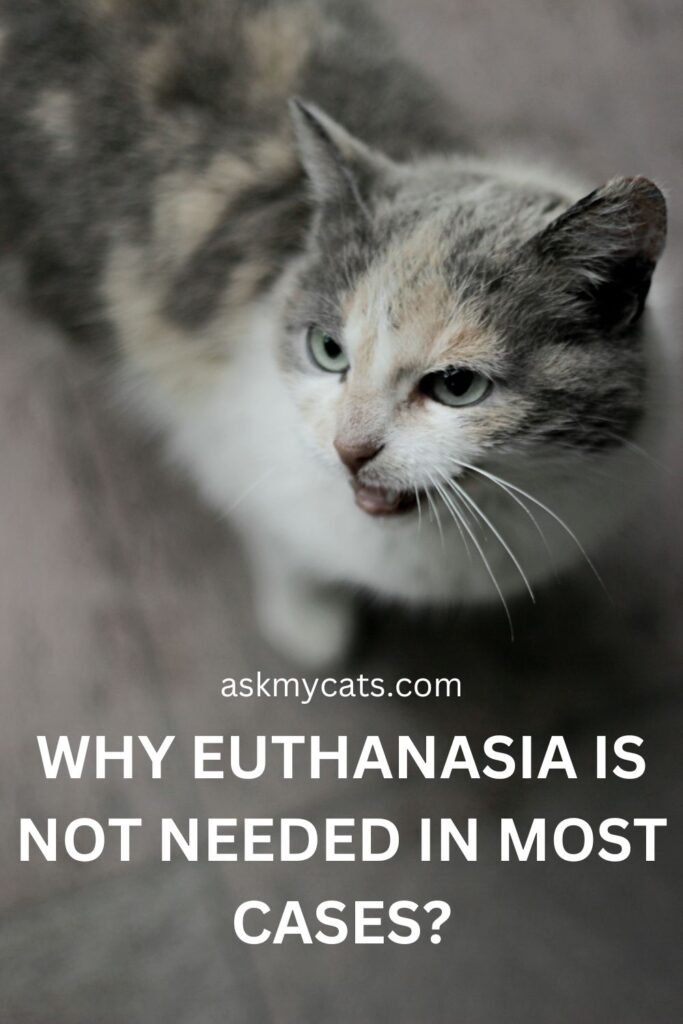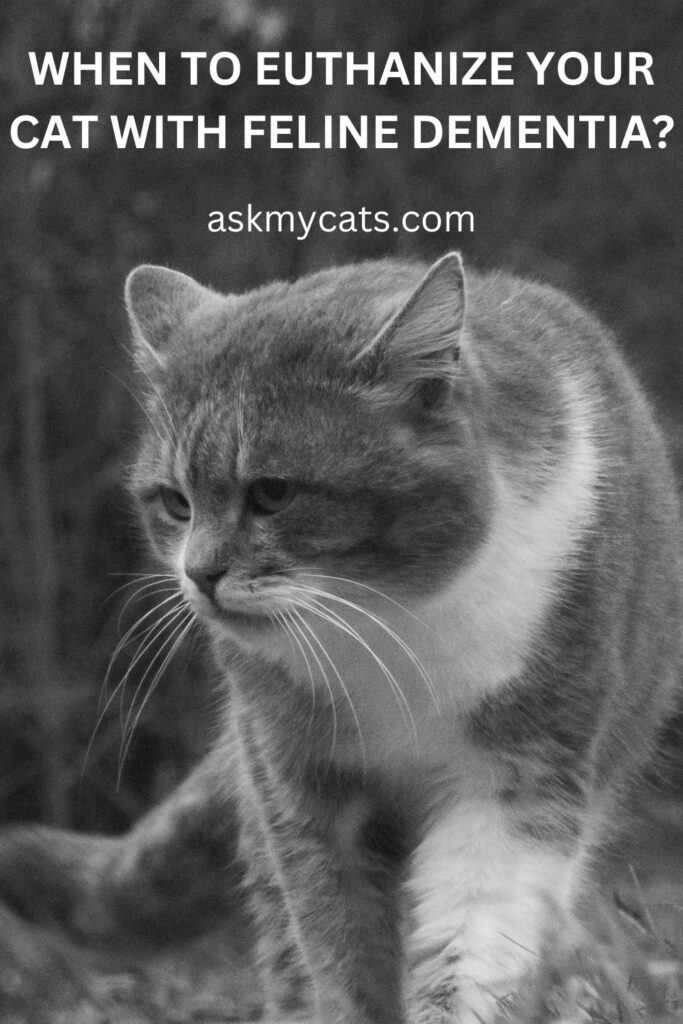Life with neurological issues is never easy. Not even a fully grown adult human can handle the impact that Alzheimer’s or dementia has on daily life.
The problem becomes all the more tricky when your cat starts experiencing such problems.
Feline dementia, better known as feline cognitive dysfunction syndrome, impacts mostly elder cats above the age of 10 years. It makes navigating daily life difficult for your old cat.
But is it really necessary to euthanize a cat with feline dementia?
Key Takeaways
- The life expectancy of a cat with feline dementia is 5 to 10 years after the diagnosis.
- Euthanasia is not needed for most cases of feline dementia as it is a manageable condition.
- Euthanasia should be considered when a cat’s quality of life is severely impacted by the combined effects of aging and dementia.
- Symptoms to look out for include refusal to eat, chronic nausea, inability to defecate, refusal to use the litterbox, severe and chronic anxiety, and panic attacks.
- Consult a veterinarian and other trusted sources before making the decision to euthanize a cat with feline dementia.


Give Your Cat the Perfect Day
Get the Free Ebook!
Life Expectancy Of A Cat With Feline Dementia

As with any chronic health problem, the first thing to know is the life expectancy of a cat suffering from that ailment.
When it comes to feline dementia, an ailing cat can still live comfortably for 5 to 10 years after the diagnosis.
This means that while feline dementia is a chronic health problem, it will not cut the lifespan of your cat short. It progresses slowly and can be managed well if you make some changes in the lifestyle of your cat.
Some changes that help manage the symptoms of feline dementia better include:
- Maintaining a regular feeding schedule
- Changing the diet of your cat to include more omega-3, vitamin B12, and vitamin E
- Keeping your cat stimulated with regular playtime every day
- Cat-proofing the house to make it safer for your cat
- Regular checkups with the vet
- Taking assistance from a certified veterinary behaviorist
- Increasing the duration of cuddling and physical interaction every day to make your cat feel safer
Unless you make all these changes and try to improve the lifestyle of your cat, jumping to euthanasia will be reckless. Feline dementia can be managed.
Your cat needs you to be gentler and more patient with it as it tries to make sense of this disorienting neurological problem.
Check out the in-depth guide: When To Put Your Cat Down? The Complete Checklist
Why Euthanasia Is Not Needed In Most Cases?

Sadly, most cat owners are inclined to euthanize their elder cats when they start showing symptoms of feline dementia. Many cat owners try to justify this decision by saying that feline dementia is incurable.
While that is true, we should also know that feline dementia is manageable.
Unless your cat’s lifestyle is severely impacted because of the combined effect of aging and dementia, euthanasia should not be considered.
This trend of euthanizing the elder cat with dementia is largely due to unawareness about how to manage dementia symptoms.
Interesting Read: Did I Put My Cat To Sleep Too Soon?
“Owners with an 18-year-old cat showing neurological symptoms will favor euthanasia over treatment.”
Dr. Stefanie Schwartz
DVM, MSc, DACVB
Board-certified veterinary behaviorist
In most cases, cats with feline dementia will be able to attain end-of-life naturally as they age. Euthanasia is not needed for a majority of feline dementia cases.
Interesting Read: How To Euthanize A Cat At Home?
When To Euthanize Your Cat With Feline Dementia?

You should only consider euthanasia when your cat starts feeling the combined impact of feline dementia and aging.
Aging in itself makes life harder for cats. They find it difficult to move around, eat, groom themselves, or even defecate.
When dementia starts adding disorientation and forgetfulness to it, your cat can become anxious and restless.
It is this anxiety due to the combined impact of aging and dementia that can start impacting the quality of life of your elder cat.
Also Read: Where To Euthanize A Cat For Free Or Cheap?
Some signs to look out for are:
- Total refusal to eat
- Chronic nausea after eating or drinking water
- Inability to defecate
- Total refusal to use the litterbox
- Severe and chronic anxiety
- Panic attacks on a frequent basis
When such signs become a common sight, then it may be time to consider euthanizing your cat. Even then, first, consult your vet and some friends and family who may have experienced similar incidents with their pet cats.
Euthanasia is a big decision and you should only consider it after thorough thought and consultation.
Interesting Read: How To Euthanize A Cat With Over-The-Counter Drugs?
Frequently Asked Questions
How fast does dementia progress in cats?
When your cats are 11–12 years old, their talents start to alter. After 15 years, dementia generally follows.
How can a vet tell if a cat has dementia?
There are no tests for cat dementia. To make a diagnosis, other potential reasons must be ruled out. Individual behavioral changes may result from any variety of medical disorders, but several behavioral changes might be a sign of cognitive loss.
Interesting Read: Did My Cat Know He Was Being Put To Sleep?
Final Words
Feline dementia or feline cognitive dysfunction syndrome is a chronic neurological issue that mostly impacts elderly cats of 10 or more years of age.
The lack of awareness of the management of symptoms makes many cat owners think that since feline dementia is incurable, euthanasia is the only way out.
However, that is not the case. With proper care and lifestyle changes, a cat with feline dementia can live comfortably for 5 to 10 years after the diagnosis.
Interesting Read: Should I Stay With My Cat When It Is Euthanized?
Must Read: How To Deal With Regret And Grief After Putting Cat To Sleep?
A Cat Owner’s Final Guide: What To Do After Cat Euthanasia?
Interesting Read: Is It Legal To Euthanize A Healthy Cat?
You Might Also Like To Read:
- What Are The Different Methods Of Cat Euthanasia?
- How Much Does It Cost To Euthanize A Cat?
- When To Euthanize A Cat With Cancer?
- When To Euthanize A Cat With Seizures?
- When To Euthanize A Cat With IBD?
- When To Euthanize A Cat With Kidney Failure?
- When To Euthanize A Cat With Feline Leukemia?
- When To Euthanize A Cat With Heart Failure?
- When To Euthanize A Cat With FIP?
- When To Euthanize A Cat With FIV?
- When To Euthanize A Cat With Arthritis?
- When To Euthanize A Cat With Hyperthyroidism?
